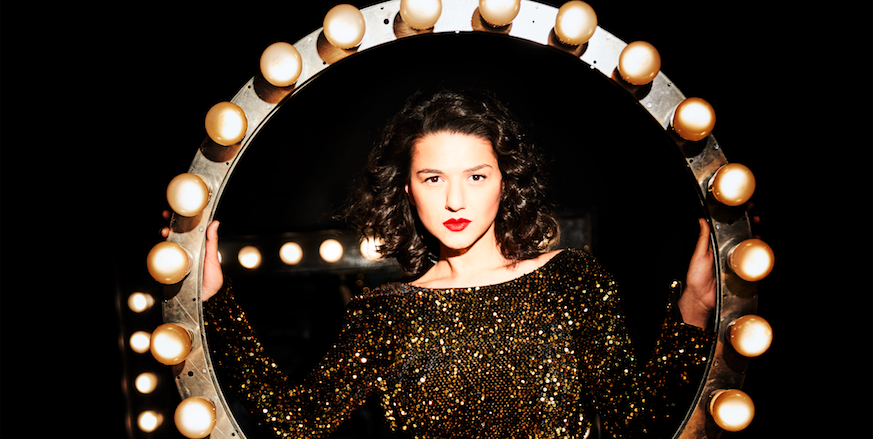Photo credit: Esther Haase/Song Classical
Khatia Buniatishvili, 31, is an acclaimed Georgian-French pianist who has played the world’s greatest concert halls from Carnegie Hall in New York City, where she made her U.S. debut, to La Scala in Milan and the National Center for the Performing Arts in Beijing. She has worked with legendary conductors including Placido Domingo, Mikhail Pletnev, and Vladimir Ashkenazy and has performed some of the world’s most technically complex, earth-shattering music by the likes of masters Franz Liszt, Sergei Rachmaninov, and Franz Schubert.
Her new album, Schubert (2019), was recently released on Sony Classical. Here, she tells me about pianos as decorating accessories, the legitimacy of the keytar, and what she likes to play when drunk, among other things. After our interview at ELLE Decor headquarters, we paid a visit to one of New York City’s most famous piano stores for an impromptu private concert at which Khatia fittingly played one of Schubert’s “Four Impromptus,” which you can view below.
You know that scene in the movie Shine in which Geoffrey Rush, who plays impresario pianist David Helfgott, walks up to a piano in a crowded restaurant and plays a mind-blowing rendition of “Flight of the Bumblebee” by Rimsky-Korsakov? Have you ever done something like that?
I have done something like that, but it was for a more precise purpose. It wasn’t to impress people. I never like to impress and always try to be very modest. Everything I do onstage is about being extroverted, impressing an audience, but it was never a goal.
How about later we walk into Faust Harrison Pianos and pretend to be buying a piano. Then, at some point, you sit down at one and do an impromptu performance. How does that sound?
Why not? I’ll play some Schubert’s “Impromptus.”
How apropos! Did you have a piano in your home growing up in Tbilisi, Georgia?
I did.
What kind?
It was an upright Soviet piano. It seemed nice at the time, but I don’t know where it is now.
Where was it located in the house?
It was in my bedroom, but it changed from time to time. I started to learn piano at age three.
You can sit down at a piano with a glass of wine and jam out to Liszt’s “La Campanella.” What do you think of people who can’t play at all buying them as decoration?
It’s their right if they want. Maybe they have guests who might play, or maybe they want their kids to learn someday. When I go to someone’s home and see a piano, I feel better. Even if it’s a superficial gesture, there might be a reason more profound behind it. You never know!
How refreshingly uncynical! Your upcoming album will feature “Four Impromptus,” by Schubert. Vladimir Horowitz’s rendition from 1963 is a personal favorite of mine. What do you bring to your version that will make it stand out?
I have no ambition to say something new. I prefer to say something personal. It’s a very intimate process adapting a piece like this, because you get to know the composer through their notes. The connection you make in your own reading of a specific piece is the only authentic way of making a creative interpretation.
When you’re sitting in front of an audience, halfway through a monumental piece like Rachmaninov’s second and third piano concertos, do you ever worry about losing focus or forgetting parts?
You’ll always have some doubts. Not when you’re onstage necessarily, but there are some profound moments of not trusting your brain. Inspiration, self-confidence, preparation, and, of course, adrenaline allow for you not to make mistakes. There’s also being in the mood to share and spread love. When you think of this, everything else is behind you.
Rachmaninov’s hands were freakishly large, with a finger span of 12 piano keys. Are there any pieces he wrote that are physically impossible for you to play?
There are some chords that are impossible to play together, but you can find a technique of doing it. Mikhail Pletnev taught me the secret.
Photo credit: Esther Haase/Song Classical
Do you consider the keytar a real instrument?
Why not? You can improvise and do rhythm on it.
Do you know what a keytar is?
Do you mean sitar?
No. I mean keytar, the electric piano-guitar made popular by synth-pop bands in the 1980s. [Shows Khatia an example on Google Images.]
Oh, wow! Well, it’s not an independent instrument, but I think you can use it well.What’s the most beautiful piano you’ve ever played?
There isn’t one. Pianos are like beings for me. Each of them has something to say. There’s woods, strings, a mixture of percussion in the strings that make each one special.
What’s your go-to piece to play when you’re drunk?
Something soft and improvised. Not a written piece. There’s no sense to play fast things when you’re drunk. It’s better to play something nice and small with improvisation if you’re really drunk.
Sad?
Music from movies by Ennio Morricone to Francis Lai.
Moody?
I don’t play music when I’m moody. I need to do something else, like having a conversation. That, or completely shutting down and hiding. I can’t relax. When I’m enraged, however, then I become impulsive.
Photo credit: Esther Haase/Song Classical
What’s your favorite piece to play before an audience?
Schubert’s Sonata D960. Playing it is like saying adieu to someone or something. It feels very natural to play and perform it. I could play it for the rest of my life.
Have you ever thought about writing your own music?
I was asked to, and I did. It feels nice to create something, so I will do it in the future. I always wanted to be someone who creates rather than simply performs, and it’s all about concentrating emotions.








